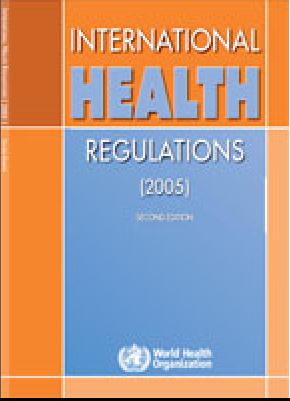 The IHR (2005) prevent, protect against, control and provide a public health response to the international spread of disease WHO has a mandate to manage and control the International spread of disease. As international travel and trade expand, the emergence or re-emergence of international disease threats and other public health risks are an increasing threat. The International Health Regulations (IHR 2005) were adopted by the Fifty-eighth World Health Assembly on 23 May 2005 and entered into force on 15 June 2007.
The IHR (2005) prevent, protect against, control and provide a public health response to the international spread of disease WHO has a mandate to manage and control the International spread of disease. As international travel and trade expand, the emergence or re-emergence of international disease threats and other public health risks are an increasing threat. The International Health Regulations (IHR 2005) were adopted by the Fifty-eighth World Health Assembly on 23 May 2005 and entered into force on 15 June 2007.
In May 2012, the 65th Session of the World Health Assembly recalled previous resolutions and stressed the importance of IHR implementation by state parties and WHO. The purpose and scope of the IHR are “to prevent, protect against, control and provide a public health response to the international spread of disease in ways that are commensurate with, and restricted to, public health risks, and which avoid unnecessary interference with international traffic and trade.” The Regulations contain a range of innovations. Provisions in the IHR have also been updated and revised in terms of many of the technical and other regulatory functions, including certificates applicable to international travel and transport and requirements for international ports, airports and ground crossings.
Overview of IHR implementation in Afghanistan
National legislation and policy
National policies have been reviewed to facilitate the implementation of IHR core-capacities. The National Health Regulations (2008) will be amended to facilitate IHR implementation by concerned partners.
Coordination
A multisectoral mechanism addresses the IHR requirements on surveillance and response for public health risks and events. A zoonotic taskforce was established between the Ministry of Public Health, the Ministry of Agriculture and Livestock, the Food and Agriculture Organization of teh United Nations and WHO. An advocacy workshop on IHR has been carried involving 16 other ministries relevant for IHR implementation. The establishment of an IHR coordination body is currently underway.
Laboratory
Afghanistan has a central public health laboratory which serves as a reference laboratory and national influenza centre. This laboratory is able to verify priority health threats. Considering the terrain of Afghanistan, regional laboratories needs strengthening for timely confirmation of samples and to maintain cold chain.
Risk communication
A risk communication plan has been developed and includes social mobilization of communities. A trained spokesperson coordinates public communications during public health emergencies requiring risk communication capacity.
Human resources
Since 2007, WHO Afghanistan has trained 57 Ministry of Public Health staff internationally, including in Masters of Public Health and other staff in a IHR diploma course. In-country training of more than 8700 health workers has also been conducted on technical and programmatic aspects of disease early warning system surveillance and response. In-country training and capacity-building benefits both national and regional staff of the Ministry of Public Health, and those, such as nongovernmental organizations, who implement the basic package of health services.
Related link








